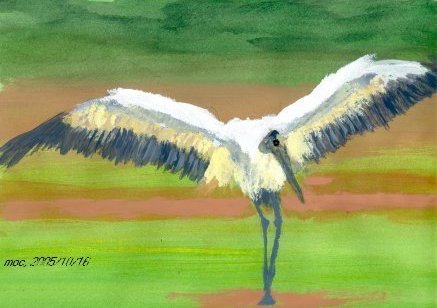Showing posts with label tai chi. Show all posts
Showing posts with label tai chi. Show all posts
20130222
20080329
The finger or the Moon


I'm reading The Elements of Tai Chi, by Paul Crompton, at the moment. In his introduction, he says Tai Chi developed at a time when Taoists influenced thinking and conduct at many levels in Chinese society but that now the total situation into which Tai Chi was introduced is gone.
Tai Chi is like a finger pointing at the Moon. The student can either study the finger [Buddha] or look at the Moon [Buddha's teaching].
This seems to be the idea behind Yoshitoshi's picture, done circa 1892, and which I saw recently at the Chester Beatty Library.
His own haiku reads:
Holding back the night
With its increasing brilliance
The summer moon
(Yoshitoshi’s death poem)
Labels:
Buddha,
tai chi,
tai chi chuan,
Yoshitoshi
20080224
Ward Off
Ward off should come from the back of the heart, through the arm(s), the fender of your space, sensitive to the partner (or, opponent), listening to him (her), responding with due diligence, opposite side ready to thwart any effort to invade your space uninvited. Alert, aware, paying attention to your partner(or, opponent) you are giving them your full attention, sunk in stance, relaxed in posture, turning at the waist when needed.
Labels:
heartwork,
tai chi,
tai chi chuan,
ward off,
Ward-off
20070427
'lifting hands' & 'playing guitar'

these are two positions for rooting discipline when 'the heart of the foot should adhere to the ground' [see Book 4 of my previous entry]. Here, one is reminded of the fundamental rooting practices, standing on one leg first and then the other for several minutes. One can use fingers on the back of a chair at first to help maintain balance and gradually get to the point of not needing the hands at all.
Labels:
lifting hands,
playing guitar,
tai chi
20070317
my 20061106 entry continued
Others books that I have read are in the last few years are:
TAI CHI The Supreme Ultimate by Robert Galante, Weiser, ISBN 0-87728-497-0
From p. 89: "The Solo Form presented in this book is the 'short' Yang style as taught to me by Grand Master Cheng Man-ch'ing"
T'AI CHI Classics, trans with commentary by Waysun Liao, Shambhala, ISBN 1-57062-749-5
From p.95: "The T'ai Chi Form originated as the thirteen postures of meditation. these are the eight postures, or directions- ... - in combination with the five different ways to maneuvre the eight meditative postures ..."
Cheng Tzu's Thirteen Treatises on T'ai Chi Ch'uan, by Cheng Man Ch'ing, North Atlantic Books, ISBN 0-938190-45-8
From p. 91: " 'I'm not a meat rack; why do you hang on my body?' "
There Are No Secrets, by Wolfe Lowenthal, North Atlantic Books, ISBN 1-55643-112-0
From p. 61: "Mastery of the art of Tai Chi Chuan is difficult; one of the functions of push hands is to remind us of how far we have to go."
The Tao Of Health and Longevity, by Da Liu, Marlowe & Co., ISBN 1-56924-718-8
From p.52: "Each of the individual movements has a potential use for self-defense, and some are named after this use. Other are named after the movement of animals that they imitate."
TAI CHI The Supreme Ultimate by Robert Galante, Weiser, ISBN 0-87728-497-0
From p. 89: "The Solo Form presented in this book is the 'short' Yang style as taught to me by Grand Master Cheng Man-ch'ing"
T'AI CHI Classics, trans with commentary by Waysun Liao, Shambhala, ISBN 1-57062-749-5
From p.95: "The T'ai Chi Form originated as the thirteen postures of meditation. these are the eight postures, or directions- ... - in combination with the five different ways to maneuvre the eight meditative postures ..."
Cheng Tzu's Thirteen Treatises on T'ai Chi Ch'uan, by Cheng Man Ch'ing, North Atlantic Books, ISBN 0-938190-45-8
From p. 91: " 'I'm not a meat rack; why do you hang on my body?' "
There Are No Secrets, by Wolfe Lowenthal, North Atlantic Books, ISBN 1-55643-112-0
From p. 61: "Mastery of the art of Tai Chi Chuan is difficult; one of the functions of push hands is to remind us of how far we have to go."
The Tao Of Health and Longevity, by Da Liu, Marlowe & Co., ISBN 1-56924-718-8
From p.52: "Each of the individual movements has a potential use for self-defense, and some are named after this use. Other are named after the movement of animals that they imitate."
Subscribe to:
Posts (Atom)
